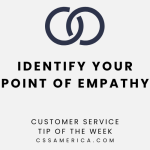When I’m watching television, listening to the radio, or listening to a podcast, it’s always interesting when the topic moves to the question: How can you be a success? The speakers often discuss the process of becoming a success with the assumption that people believe success is defined by fame, fortune, awards, power, position.
I believe success can be defined in a lot of ways having nothing to do with any of those accomplishments. Sometimes those outcomes shouldn’t be the definitions of success. So, especially as it relates to customer service, let’s define Success differently.
Noted below are three quotes. Let’s look at how they apply to our work in trying to become successful in customer service.
Effort measures success better than outcome.
When we’re engaged with the customer or dealing with a difficult situation at the office, we can control ourselves, our response, or approach to the conversation. We cannot always control the environment; we can rarely control the other people involved. But the environment and the others involved affect the outcome of the situation. So, don’t get down on yourself if the outcome wasn’t what you were hoping for or the overall tone of the conversation did not strike the right chord. Define success as having done your best.
The cost of success is exceeded only by the cost of failure.
There’s rarely a perfect solution to a complex situation. But in the vast majority of the cases, doing something gives you a better chance of success than doing nothing. Deciding to respond to the e-mail or the voicemail when you don’t have an answer, instead of not responding at all. Taking action on behalf of the customer instead of hoping that – by ignoring them – they will go away. In customer service, the cost of doing nothing is a higher likelihood of failure, of losing the customer, of engendering that negative word-of-mouth, of creating bigger issues for your co-workers down the road.
Don’t be irreplaceable. If you can’t be replaced, you can’t be promoted.
Too many people feel that knowledge is power. They believe in hoarding information or their experience or their expertise so that only they can use it. This is not only a sign of somebody who’s not a team player, but it can actually be a deterrence to career development. If we don’t share with others and try to build up and support our teammates, why would leadership want to move us up knowing that they would have a void they cannot fill?
Don’t define success purely based on the outcome. Define customer service success by your efforts, your willingness to take action on behalf of the customer, and your willingness to impart your knowledge and wisdom to others.
Signup for FREE Tips! Contact Us More Resources for You Visit Our Home Page












